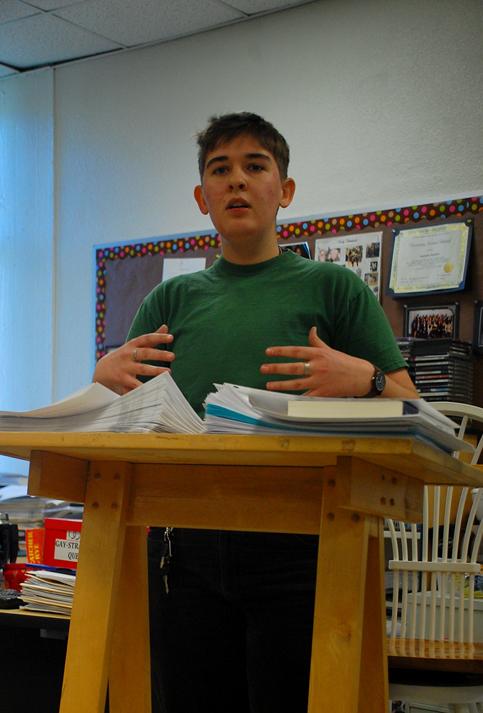GSA Guest Speaker Sheds Light on Being Transgender
“In the LGBT [Lesbian, Gay, Bisexual, Transgender] community, the ‘T’ is often ‘silent,’ as the topic of gender identity is not one usually touched upon as much,” said Isaac Burke to the GSA’s attentive members this past Monday. GSA advisor Stephanie Sajjadieh had invited Burke, a 2009 Clark alumnus and former GSA member, to speak to 15 members of Clark’s GSA about his experiences as an FTM (Female To Male) transgender youth.
As a young child, Burke (then, Emily) said that his parents recall him expressing that he did not identify with the female body he was born into. “At an early age, I could recognize the difference between boys and girls, but I felt like I was on the wrong side,” said Burke. However, said his parents dismissed these sentiments as part of a phase when he was growing up. “Before long, I was a little kid with a dangerous secret,” said Burke, “and I felt like if I were found out, I would be more ostracized than I already was.”
When Burke entered high school and began to go through puberty, he said that the typically-awkward phase was further complicated with his issues regarding his gender identity.
“I encountered being treated as a woman when I wanted to express myself as a young man coming of age, and it just couldn’t happen that way,” said Burke. “I felt like I had no control and that I just had to accept my fate.”
To cope with this inner struggle, Burke said that he found solace in video games where he could have an alternate identity through male avatars, characters and names. Burke said that this avenue of self-expression was important to him because it was safe and no one else could discover it.
Despite knowing the controversy it would bring to his life, Burke decided to come out as a transgender man while in college at USC. “Lying about who you are, because it’s in line with what people expect, gets very painful,” Burke said.
Burke also elaborated on the struggle he now faces on deciding when and how to come out to people he has just met. “Whenever I meet someone new, I immediately have to decide what name to give them. Do I tell them what they want to hear to protect myself from their prejudice or do I give them permission to know who I am and have them as my ally, making myself vulnerable. It’s an emotionally-terrifying decision,” Burke said. “When you meet a transgender person, just be aware that they have had a very long struggle behind them, and that struggle is far from over.”
Burke further described the unique predicaments that transgender men like himself must confront in order to be legally recognized as male and to physically become what corresponds to their mental identity. An example includes deciding whether to take testosterone in order to become more physically masculine, although six months of hormone treatment could render him permanently infertile. “I’m only twenty-two, and having to make all of these serious life decisions at such an early age makes me feel cornered, quite frankly,” Burke said.
Of the students present at this GSA meeting, many like sophomore Lauren Alparaz say they have gained much insight into the plight of LGBT youth. “I realized how much bravery and vulnerability were involved with coming out to family, friends and strangers about who you are,” Alparaz said. “I have so much respect for [Burke] being able to be true to himself despite the challenges he faced.”
Despite only graduating from high school five years ago, Burke noted that today there are more support resources, such as YouTube videos and highly-developed online forums, available to LGBT teens than there were when he was a teenager. Adding some words of coming-out advice for teens struggling with their sexual or gender identity, Burke said that writing letters is a great medium because it “allows you to say everything you want to say without being interrupted and gives the recipient a chance to reflect before having a knee-jerk reaction. Also, come out to someone who is familiar with LGBT youth, like a teacher or professor, someone who has most likely dealt with other LGBT kids before and can be very understanding.”
Although transgender people do face many obstacles in modern society, Burke said that he has found comfort in the fact that transgender people do find love and form families, and in Christianity. “The assumption is that living as an LGBT individual and being Christian are mutually-exclusive,” said Burke, “but I can say that I took a lot of comfort from my faith during my coming-out. I had to come to terms with God, that He made me this way for a reason. After I accepted this, I felt a sense of purpose that allowed me to move forward in a way that nothing else could compare to.”








